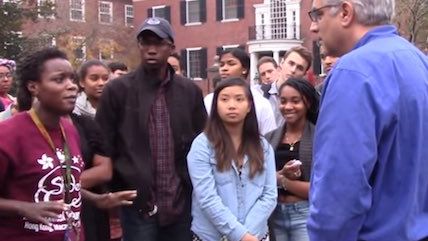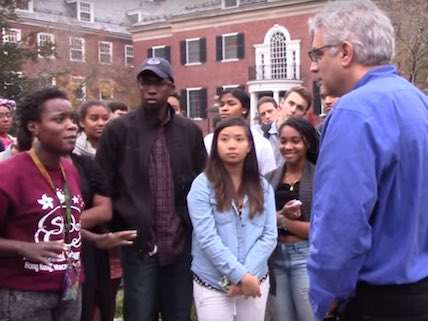Video: More Crazed Yale Students Attack Staffer for 'Creating Space for Violence'
Think safe spaces aren't a problem? You might change your mind after watching these students shout at Nicholas Christakis.


The Yale University student who screamed at Nicholas Christakis—former master of Yale's Silliman College—wasn't alone, according to several other videos of the incident from last fall that were recently publicized.
Indeed, a group of students hounded Christakis, and many of them levelled absurd accusations that he was promoting violence on campus. Others snapped their fingers to express agreement with the several agitated students.
"You have created space for violence," said one student. When Christakis said he disagreed with that statement, she replied, "You can't."
Another student was even less polite. "I am sick looking at you," this student told Christakis. "I am disgusted knowing that you work at Yale University."
As a reminder, Christakis's moral failing—in the students' view—was siding with his wife, who had recently sent an email to students expressing her disagreement with an administrative reminder not to wear offensive or culturally-appropriative Halloween costumes. Students don't need the university telling them how to dress on Halloween, said Erika Christakis.
The students who besieged her husband in early November of last year disagreed.
Students were also upset at the time about a campus fraternity party that had allegedly turned away black students, though that rumor was thoroughly debunked later.
The Christakis confrontation was back in the news last week after Yale lecturer Jim Sleeper wrote an op-ed for The New York Times in which he accused Foundation for Individual Rights in Education President Greg Lukianoff—who recorded the original video of the student shouting at Christakis—of revealing personal information about the student. Lukianoff did not do this: a Daily Caller article identified the student. The NYT was forced to issue a correction, thank goodness.
Sleeper's implicit point is that free speech advocates are misrepresenting the threat posed by the students themselves. But I suspect most people who watch these four videos of the confrontation with Christakis—which were publicized in a recent article by James Kirchick—will draw the conclusion that Yale is home to a small but significant contingent of students who are militantly in favor of emotional coddling and safe spaces. (Read Nick Gillespie's thoughts on the Sleeper op-ed here.)
Safe spaces, of course, have been in the news quite a bit lately—alongside trigger warnings, their first cousins. In the wake of the University of Chicago's controversial letter to freshmen warning them not to expect trigger warnings and safe spaces, many critics of the idea that a wave of political correctness is eroding free expression on campus have seized on the notion that safe spaces don't threaten anybody's rights. Vox's Emily Crockett gives "hair salons, gay bars, and black churches" as examples of safe spaces and describes them as places where members of a certain identity group—gay people, people of color—can feel at ease and safe from discomfort. Defenders of safe spaces have tended to point out that there's absolutely nothing wrong with people forming voluntary associative groups based around common beliefs or identity membership.
And they're right: this kind of safe space is perfectly fine, and no honest advocate of free expression would object to it. Free association is a logical extension of free expression. Students can and should take advantage of their right to sort themselves into private collectives.
But that's not really what's at stake in the debate over safe spaces. Free speech advocates object to students' demands for non-private forums—classrooms, residence hall common areas, public squares—to be be transformed into safe spaces. As Jonathan Chait wrote in a rebuttal to Crockett:
It is very strange to read Chicago's letter as a threat to forbid outings to gay bars or black churches. The letter is obviously directed at the common practice of delineating common public spaces on campus, like classrooms or auditoriums, to be "safe spaces" where political discourse must adhere to left-wing dogma.
The additional videos of the Christakis confrontation validate the letter's concerns about the overall climate for free expression on campuses—and the threat posed by hyper-offended students. The students demand that Christakis apologize to them. He explicitly did so, saying that he was sorry for "hurting their feelings." When they objected to that terminology and asked that he apologize for causing them pain, he complied. But then they pressed him to apologize for "creating space for violence to happen," Christakis had had enough. "That I disagree with," he said.
"It doesn't matter whether you disagree," one student replied.
It's crystal clear that these students want the kind of safe space that threatens intellectual freedom. Their ideal safe space isn't just a private area where they can go to be at peace with like-minded individuals. They believe that the entire campus is made unsafe—is made susceptible to violence—when people express views that clash with their far-left vision of social justice.
Read Shikha Dalmia on the threat safe spaces post to intellectual freedom here.


Show Comments (276)